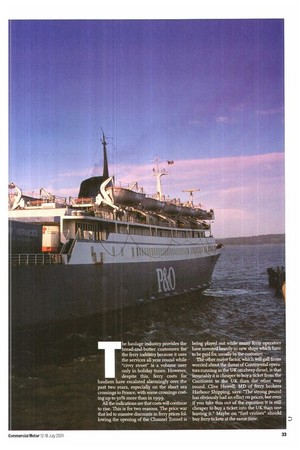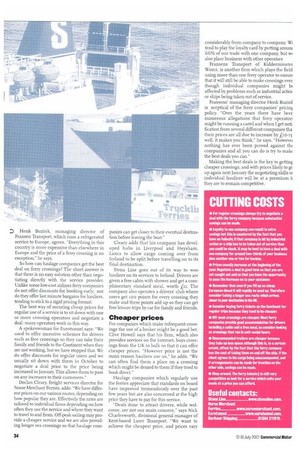T he haulage industry provides the bread-and-butter customers for the ferry
Page 33

Page 34

If you've noticed an error in this article please click here to report it so we can fix it.
inatistry because it uses the services all year round while "ciwy street" is a volume user only in holiday times. However, despite this, ferry costs for hauliers have escalated alarmingly over the past two years, especially on the short sea crossings to France, with some crossings costing up to 50% more than in 1999.
All the indications are that costs will continue to rise. This is for two reasons. The price war that led to massive discounts in ferry prices following the opening of the Channel Tunnel is being played out while many ferry operators have invested heavily in new ships which have to be paid for, usually by the customer. The other major factor, which will gall firms worried about the threat of Continental operators running in the UK on cheap diesel, is that invariably it is cheaper to buy a ticket from the Continent to the UK than the other way round. Clive Howell, MD of ferry brokers Harbour Shipping, says: The strong pound has obviously had an effect on prices, but even if you take this out of the equation it is still cheaper to buy a ticket into the UK than one leaving it." Maybe on "fuel cruises" should buy ferry tickets at the same time. Henk Buzink, managing director of Fransen Transport, which runs a refrigerated service to Europe, agrees. "Everything in this country is more expensive than elsewhere in Europe and the price of a ferry crossing is no exception," he says.
So how can haulage companies get the best deal on ferry crossings? The short answer is that there is no easy solution other than negotiating directly with the service provider. Unlike some low-cost airlines ferry companies do not offer discounts for booking early; nor do they offer last minute bargains for hauliers, tending to stick to a rigid pricing format.
The best way of securing cheap prices for regular use of a service is to sit down with one or more crossing operators and negotiate a deal: many operators work in this way.
A spokeswoman for Eurotunnel says: "We used to offer incentive schemes for drivers such as free crossings so they can take their family and friends to the Continent when they are not worldrig, but we have stopped that. We do offer discounts for regular users and we usually sit down with them in October to negotiate a deal prior to the price being increased in January. This allows them to pass on any increases to their customers."
Declan Cleary, freight services director for Norse Merchant Ferries, adds: "We have different prices on our various routes, depending on how popular they are. Effectively the rates are tailored to individual firms depending on how often they use the service and where they want to travel to and from. Off-peak sailing may provide a cheaper service and we are also providing longer sea crossings so that haulage corn
panies can get closer to their eventual destination before leaving the boat."
Cleary adds that his company has developed hubs in Liverpool and Heysham, Lancs to allow cargo coming over from Ireland to be split before travelling on to its final destination.
Stena Line goes out of its way to woo hauliers on its services to Ireland. Drivers are given a free cabin with shower and get a complimentary standard meal, worth Lir. The company also operates a drivers' club where users get ioo points for every crossing they make and these points add up so they can get free leisure trips by car for family and friends.
Cheaper prices
For companies which make infrequent crossings the use of a broker might be a good bet. Clive Howell says that his firm, which also provides services on the Internet, buys crossings from the UK in bulk so that it can offer cheaper prices. "However price is not the main reason hauliers use us," he adds. "We can often find them a place on a crossing which might be denied to them if they tried to book direct."
Haulage companies which regularly use the ferries appreciate that standards on board have improved tremendously over the past few years but are also concerned at the high price they have to pay for this service.
"Deals done to attract drivers, while welcome, are not our main concern," says Nick Charlesworth, divisional general manager of Kent-based Laser Transport. "We want to achieve the cheapest price, and prices vary considerably from company to company. WI tend to play the loyalty card by putting aroum 66% of our trade with one company, but wi also place business with other operators Fransens Transport of Kidderminster Worcs, is another firm which plays the field using more than one ferry operator to ensuri that it will still be able to make crossings ever though individual companies might bi affected by problems such as industrial actior or ships being taken out of service.
Fransens' managing director Henk Buzini is sceptical of the ferry companies' pricir4 policy. "Over the years there have beer numerous allegations that ferry operator: might be running a cartel and when I get noti fication from several different companies tha their prices are all due to increase by Do-15 well, it makes you think,' he says. "Howevei nothing has ever been proved against th( companies and all you can do is try to mak( the best deals you can."
Making the best deals is the key to gettinE cheaper crossings, and with prices likely to gc up again next January the negotiating skills of individual hauliers will be at a premium ii they are to remain competitive.








































































































